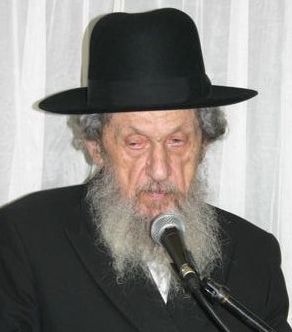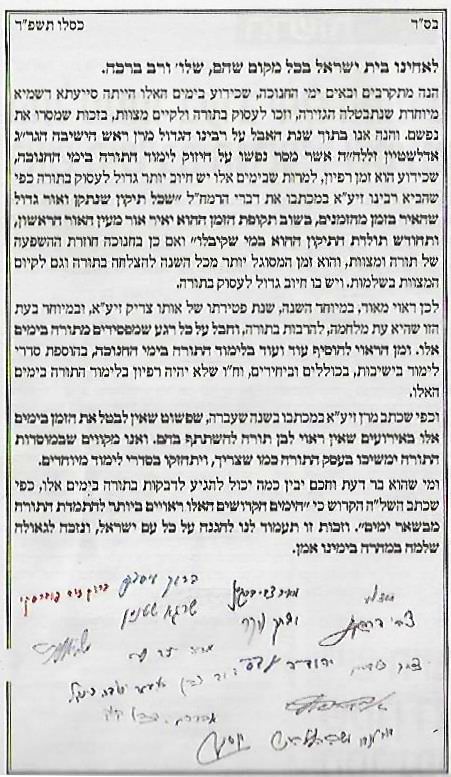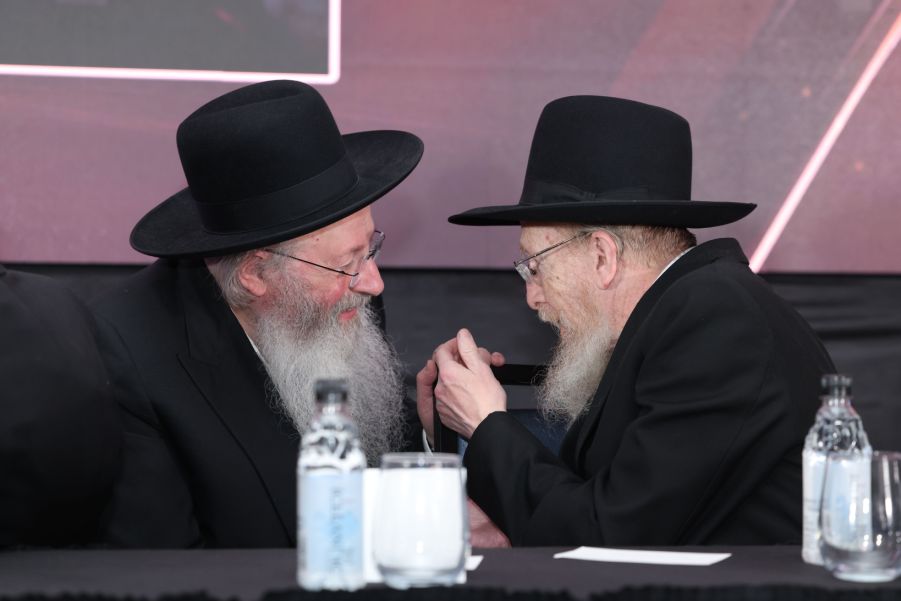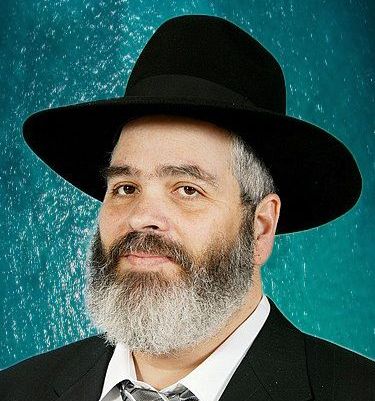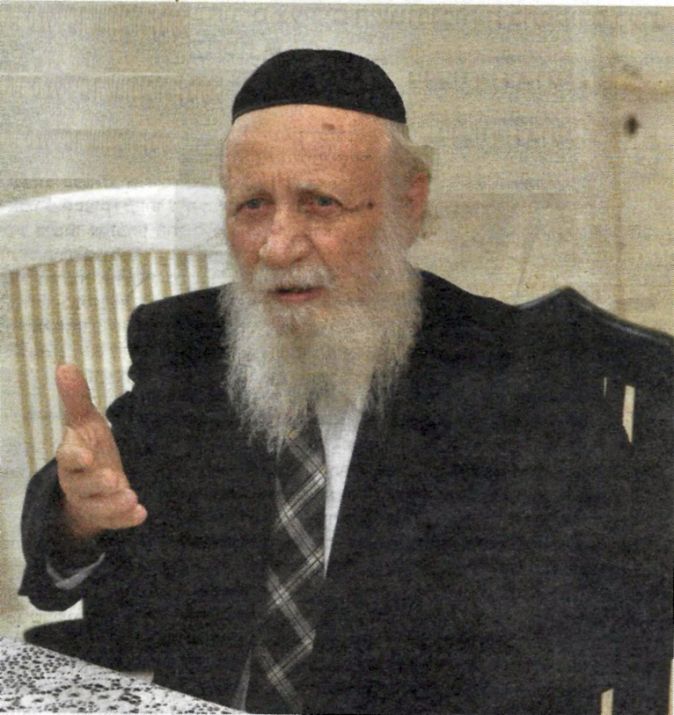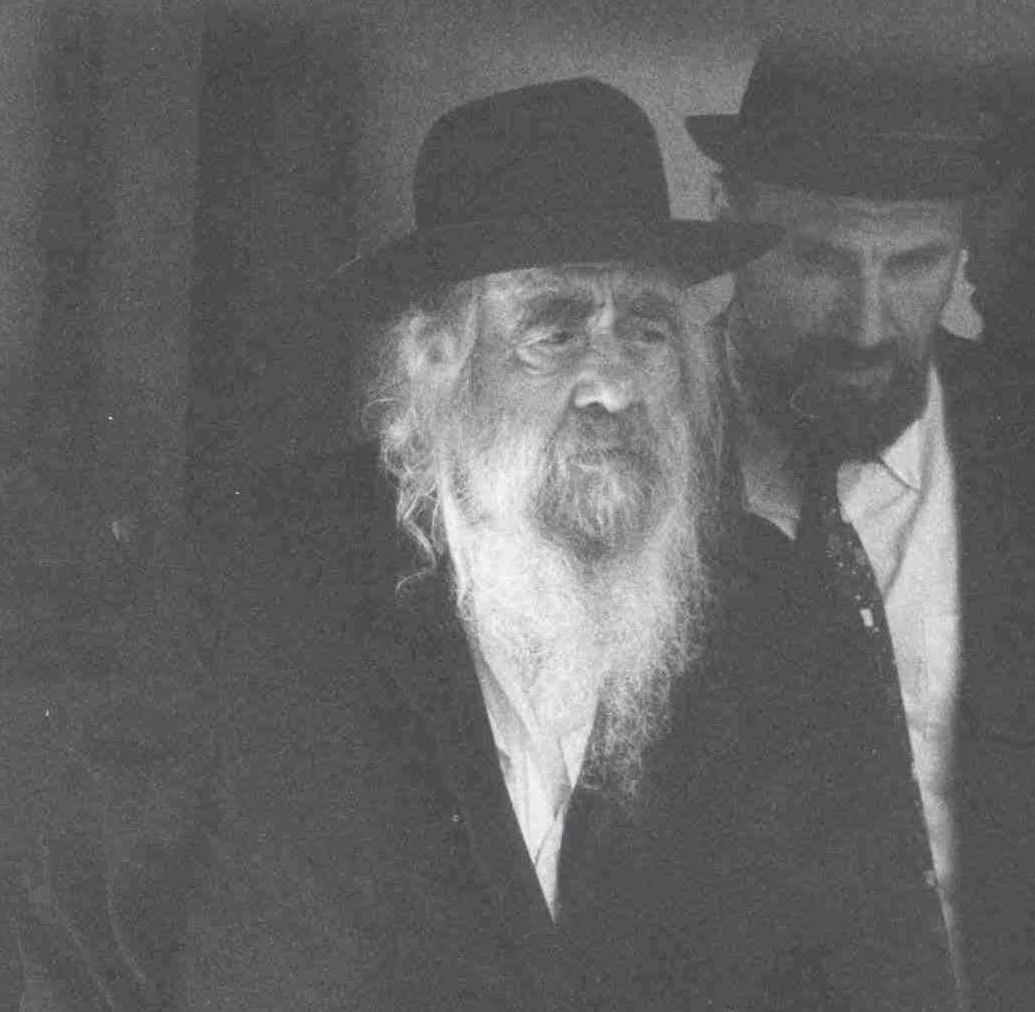  |
|
| ||||||
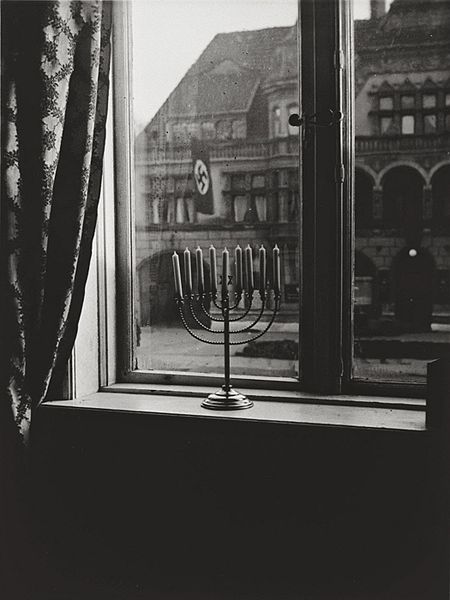
This Google Custom Search looks only in this website. Letter of HaRav Dov Lando shlita: Thoughts for These Times
We have no knowledge of the ways of Heaven. But every measure of strengthening in relations between our fellow Jews is surely favorable before Hashem.
Of supreme importance is making allowances, not bearing grudges or feelings of rancor against a fellow Jew, whoever he may be, regarding whatever the situation. One must practice forbearance (vitur) since this arouses Heavenly compassion, especially in those cases where a person is convinced that he is in the right.
Additionally...
To our brothers, Beis Yisroel, wherever they be: Shalom and much blessing:
The days of Chanukah are fast approaching. We are all aware that this season was privy [in the past] to amazing Heavenly assistance which succeeded in annulling the decrees. At this time, they were fortunate to be able to study Torah and perform the mitzvos in the merit of their self-sacrifice.
We find ourselves in the midst of the year of mourning for Rabbenu the Rosh Yeshiva HaRav Gershon Edelstein, who sacrificed himself for the buttressing of Torah especially during the days of Chanukah which are known to be a time of laxity, when really this should be a time for intensified study. As he expressed in his letter quoting the Ramchal: 'Every tikkun which was made, and every great light that illuminated during a season — when that season of the year comes around, that great light will illuminate again recalling the original light. And the developments of that tikkun will revitalize and reappear to those who embrace it.'
Therefore on Chanukah the light of Torah and mitzvos recurs, and it is an increased auspicious time for success in Torah study and in perfection in mitzvah observance. Therefore it imposes a greater obligation for Torah study.
It is indeed recommended,...
With Eretz Yisroel in the midst of crisis, how does the Torah world in the United States move forward? Speakers at this year's Agudah Convention in the Armon Hotel in Stamford, Connecticut, addressed questions pertaining to the situation in Eretz Yisroel, its effects on American Jewry, and what our response should be.
The convention, 'Call to Action,' began Thursday, November 30, and emphasized the need for American Jews to take action in response to the current situation. With presentations from leading Rabbonim and askonim, participants received direction from our Gedolim and directions to put practical solutions into effect.
Among the many sessions, and emblematic of the focus on our responsibility in this time of tzoroh, was this year's Thursday night keynote, titled, 'Reb Yisroel Bein Ha'Amim: Challenges, Opportunities, Issues, and Solutions.'
Rabbi Gershon Miller, Rosh Hamosad of Yeshiva Beth Yehuda, said, "We would assume that the first casualty of what happened would be emunas Yisroel... and get the very opposite took place. Everywhere in the world we ran into Hashem's Hands!"
MK member Galit Distal-Atbaryan from the Likud is not afraid to saying what lies on her heart, even if there are many — truly many — who reject her style. Not even Prime Minister Netanyahu, who organized a seat for her in the Knesset after she enthusiastically rooted for him everywhere, voicing her support publicly. She does not define herself as religious and has no background of the kind. And yet, she stood up in the Knesset plenum in avid defense of the budget for Torah students and even touted the importance of Torah students for the protection of the Jewish people.
This is unquestionably a rare voice to be heard in this place and surely made everyone sit and take note. Not that we need her voice for reassurance that Torah is the only genuine source of Jewish defense and protection, but certainly, the reward for her words will stand her in good stead. In her words:
I see that each time the topic of chareidim surfaces, even if we are talking about teachers involved in the program of "Ofek Chadash - A New Horizon" who earn a bit more than the minimum wage, all of a sudden, everyone is up in arms. As one whose entire family exercises its army service, as a tax-paying citizen and one who belongs to the secular world, I ask why don't we internalize one of the finest principles of Judaism of 'one foot here, one foot there.'
We find the portions of Chumash Bereishis teaching us the ways of our Ovos and Imahos where it is written: "And Hashem remembered Rochel and hearkened unto her and opened her womb." Rashi comments, "He remembered [to her credit] that she transmitted the signs to her sister. She was distressed lest she be married off to Eisov in the event that Yaakov divorced her since she had not borne children. Eisov also thought thus."
Rashi writes here two things which are very relevant to us now. First, Rochel prayed for children, knowing that these would form the future of Jewry. Nevertheless, she had relayed the signs to her sister, realizing that perhaps she would not have a part in the building of the Jewish nation. This is an expression of a kindness in person-to-person relations. One cannot cause pain to a sister who would suffer great embarrassment if she did not know the signs agreed upon between Yaakov and Rochel.
This great act overrode the seven years during which Yaakov prayed for her, and her own prayers for children, for they were not enough, while her transmitting of the signs were considered sufficient merit to overcome her barrenness.
Why, indeed?...
The following are some precious observations and thoughts about Chanukah that I was privileged to hear in person from Rav Yaakov Kanievsky ztvk'l, the Steipler. These comments of Maran zt'l were of course only intended to arouse discussion among Torah scholars, and not to determine halochos.
"And Buy Oil And Lamps"
The Rambam (Hilchos Chanukah 4:12) writes: "The mitzvah of Chanukah lights is an extremely beloved mitzvah; a person must be heedful to do it in order to declare the miracle publicly, to add to Hashem's praise, and to show gratitude to Him for the miracles that He did for us. Even if he is totally supported by charity, still he must borrow money or sell his clothing and buy oil and lamps and light them."
How much "oil and lamps" does this destitute person need, who had to sell his clothes to purchase them?
Rain and Kinneret Watch by Dei'ah Vedibur
Staff
Our weekly report of the rain and the level of the Kineret -
Winter, 5784.
* * *
Outstanding Articles From Our Archives
Opinion & Comment
by Mordecai Plaut
". . . Life and death I have put before you, and blessing and curse. And you should choose life so that you and your descendants will live" (Devorim 30:19).
Is it wrong to add: "Don't choose death"?
Is it an unwarranted, or intolerable, restriction of someone's freedom if rabbonim say to him: "This reading material is deadly for your soul. Keep away."?
Are rabbonim expected to just "mind their own business" (which is truly in part the spiritual health of Klal Yisroel) and not speak out when they see people who sincerely seek the truth and wish to expand and deepen their knowledge and understanding of Torah, and innocently try to realize their ambitions by studying "books [that] are in opposition to our Torah" (HaRav Shechter and HaRav Kamenetsky) and in fact "do terrible offense to our hallowed tradition, and distort and undermine the Torah's clear truths," as the Novominsker Rebbe wrote?
IN-DEPTH FEATURES
by Binyamin Y. Rabinowitz
This old article takes on new relevance in the context of the previous extended controversy about judicial reform in Israel. It provides historical background for the recent effort.
In this interview with Yated Ne'eman, veteran rabbinical pleader Rabbi Tzvi Weinman, who has vast legal experience in protecting our fundamental values and veteran chareidi lawyer Rabbi Refael Shtub, also an active player in many such campaigns, discuss chareidi Jewry's relationship with the supposedly impartial High Court of Justice (Bagatz) and the many fierce wars of words that have raged as the result of its rulings.
Part Two
Behind the Scenes
YN: Let's return to the Bagatz.
Obviously the status quo has undergone a prolonged process of being whittled away, to the detriment of the chareidi community. On the other hand though, in the agreement about the Dovrat Commission's educational reforms, Bagatz refused to allow the reforms to be imposed on the chareidi educational system. This is a very fundamental question. We are always attacking Bagatz but the question is, aren't there also some cases where it has the effect of shielding the chareidi community from governmental tyranny?
Shtub: Bagatz's decision about the Dovrat Report is nothing to get excited about. There are two aspects to the whole way that the Bagatz functions. It is an extremely cunning instrument that has an additional in-built function of which the public is unaware. A closed forum exists where representatives of the Bagatz, the Security Services and the Government - usually the Prime Minister's representative - meet. That is where the real decisions that affect every area of the country's life are made. Don't imagine that the President of the Court suddenly arrives at decisions with the other judges, or that decisions affecting all kinds of military and scientific matters suddenly get made. These things are decided and known in advance.
A large proportion of the appeals to the Bagatz are therefore mere public relations. You might think that you are putting forward a legal argument, that the other party argues differently and that the State's representative takes a third view - that there is some kind of interplay of legal issues and that the final ruling results from a process in which certain principles of decision making are employed [but it doesn't work that way]. Things follow the usual and, on the whole, prearranged course that the State's institutions have determined. From their point of view, the Bagatz is the final and the supreme body that allows matters to proceed in the channels that the State has decided they should follow.
It's true that in theory, there needs to be a forum where a downtrodden and degraded minority who are trampled on by the majority, can go to try and save their skin but that only applies when the minority is enduring physical suffering or economic hardship. With regard to the Jewish religion, Bagatz is just another means of crushing.
Weinman: Show me one other country where an institution like Bagatz exists. There's no such thing in America, nor anywhere else.
Opinion & Comment
by HaRav Boruch Dov Povarsky
The gemora in Shabbos 21b asks: What is Chanukah?
When the Greeks entered the Beis Hamikdosh, they defiled almost all the oil. All that could be found was one cruse of oil, but a miracle happened and they were able to light the Menorah from it for eight days.
Was the main focus of the miracle upon the oil or upon the victory? We find that Al Hanissim only mentions the latter. Why then, did the Sages commemorate the miracle of the oil primarily, by lighting candles? They go on to explain that many make a mistake about the significance of the military victory.
Many falsely attribute the military victory to the might and prowess of the Jewish fighters and to their clever tactics, thereby diminishing the miracle itself, whereas the miracle of the oil was apparent for all to see. We must then, draw the comparison and conclude that just as the miracle of the oil was overt, no less was the military victory an open miracle of "many in the hands of few" etc. If we admit the one, we must admit the other as well.
Midrash Rabbah, Parshas Bereishis teaches: When the Torah states, "And the earth was without form," it is referring to the kingdom of Bovel. "And void," refers to the exile of the Medes. "And darkness," refers to the exile of the Greeks, who darkened the eyes of Israel through their decrees when they said: "Inscribe for yourselves, upon the horn of the ox, that you have no part in the G-d of Israel."
Further, it states that a river went forth from Eden from where it separated into four: The Pishon refers to Bovel. The second, the Gichon, represents Medea. Chidekel is Greece which was sharp (chad) and lightweight (kal) in its decrees. It used to say to Israel: "Inscribe for yourselves . . ."
Later, in the Bris Bein Habesorim, the "triple calf" represents Bovel, the triple goat stands for Medea and the triple ram is Greece. The commentaries pointed out that in Daniel (chapter 8) it states that the bird and the goat mentioned there are the king of Greece. Later, at the Bris Bein Habesorim it says that Hashem imposed a great, dark dread. "Dread" denotes Bovel and darkness is Greece which darkened the eyes of Israel with its decrees etc.
This entire excerpt needs an explanation. What is unique about the Greek exile? What is the meaning of: "Inscribe for yourselves upon the horn of the ox . . .?"
|
||||||




.jpg)
